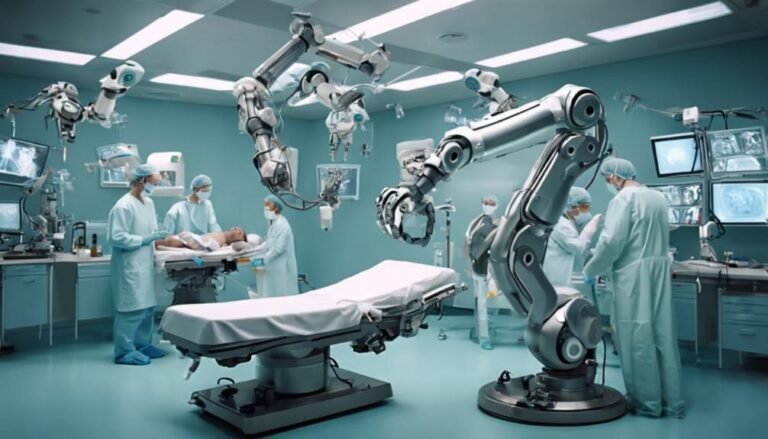AI in Cardiology
Imagine AI as a skilled assistant in a cardiology clinic, meticulously analyzing intricate patterns in cardiac data to uncover hidden insights. As you witness the transformation AI brings to traditional cardiology practices, consider the profound impact it has on patient care and outcomes. The synergy between human expertise and AI capabilities is reshaping how cardiovascular diseases are diagnosed, treated, and managed. The potential for AI in cardiology is boundless, promising a future where precision and efficiency converge to elevate healthcare standards.
Key Takeaways
- AI enhances diagnostic accuracy in cardiology through advanced algorithms and machine learning.
- Predictive models powered by AI accurately forecast patient outcomes for personalized care.
- AI streamlines treatment plans by analyzing patient data for well-informed decisions.
- Challenges in AI implementation include data quality, integration, and physician acceptance barriers.
- Integration with existing systems and overcoming physician resistance are crucial for maximizing AI benefits in cardiology.
Advancements in AI Technology
In the field of cardiology, advancements in AI technology have revolutionized diagnostic accuracy and treatment strategies. AI algorithms, powered by machine learning, have enabled healthcare providers to analyze vast amounts of data with unparalleled speed and precision.
One significant application of AI in cardiology is remote monitoring through telemedicine. This technology allows for continuous tracking of patients' cardiac health remotely, providing real-time insights and early detection of potential issues.
AI algorithms play a vital role in interpreting data from various cardiac monitoring devices, such as wearable sensors and implantable devices. Through continuous analysis of this data, AI can detect subtle changes in heart rhythms or other parameters that may indicate the onset of cardiovascular problems.
This proactive approach to remote monitoring not only enhances patient care but also allows for timely interventions, ultimately improving outcomes and reducing the burden on healthcare systems.
The integration of AI technology in remote monitoring and telemedicine showcases the potential for transformative changes in how cardiovascular care is delivered and highlights the importance of embracing innovation in the field of cardiology.
Improved Diagnostic Accuracy
AI technology has significantly improved imaging interpretation in cardiology. This has enabled more precise analysis of complex cardiovascular images. These advancements have also enhanced early detection capabilities, allowing healthcare professionals to identify potential issues at a much earlier stage.
Enhanced Imaging Interpretation
Utilizing advanced algorithms and machine learning techniques, cardiologists can now achieve unparalleled precision in interpreting cardiac imaging studies, leading to greatly enhanced diagnostic accuracy. Through automated analysis, AI algorithms can efficiently process large volumes of imaging data, detecting subtle patterns and abnormalities that might be missed by the human eye. Image enhancement capabilities allow for clearer visualization of cardiac structures, aiding in the identification of minute details essential for accurate diagnosis.
These AI tools can assist in different imaging modalities such as echocardiography, magnetic resonance imaging (MRI), and computed tomography (CT), providing cardiologists with thorough insights into the patient's cardiac health.
Early Detection Capabilities
With improved early detection capabilities, cardiologists can greatly enhance diagnostic accuracy in identifying cardiac abnormalities using AI-driven algorithms and machine learning techniques. AI in cardiology offers the potential for early detection by analyzing vast amounts of patient data with precision and efficiency.
Remote monitoring enabled by AI allows continuous tracking of patients' cardiac health parameters, offering real-time insights that aid in the timely identification of any deviations from the norm. This proactive approach to monitoring enables prompt intervention before conditions worsen, potentially preventing adverse events.
Moreover, AI algorithms can provide personalized interventions based on individual patient profiles, considering factors such as medical history, lifestyle, and genetic predispositions. By tailoring treatment plans to each patient's unique characteristics, cardiologists can optimize outcomes and improve overall patient care.
The combination of early detection capabilities and personalized interventions through AI technology represents a significant advancement in the field of cardiology, empowering healthcare providers to deliver more effective and targeted care to patients.
Predicting Patient Outcomes Effectively
Efficiently predicting patient outcomes in cardiology poses a critical challenge that can be addressed through advanced artificial intelligence algorithms. Outcome prediction and patient prognosis play an essential role in improving treatment strategies and enhancing patient care. Machine learning techniques have revolutionized the field of cardiology by enabling the analysis of vast amounts of patient data to forecast potential outcomes accurately.
Using sophisticated data analysis methods, AI algorithms can identify patterns and trends within patient data that may not be readily apparent to healthcare providers. By incorporating various patient variables such as medical history, diagnostic test results, and lifestyle factors, AI systems can generate personalized prognostic models to predict outcomes like disease progression, risk of complications, or response to treatment.
These predictive models not only aid in clinical decision-making but also empower healthcare professionals to intervene proactively, optimize treatment plans, and provide patients with personalized care tailored to their specific needs.
Ultimately, the integration of AI-driven outcome prediction tools in cardiology holds immense promise for improving patient outcomes and enhancing the overall quality of care.
Streamlining Treatment Plans With AI
To optimize patient care in cardiology, AI can streamline treatment plans by leveraging predictive models based on thorough patient data analysis. By harnessing AI capabilities, healthcare providers can deliver personalized care that's tailored to individual patient needs. AI algorithms can sift through vast amounts of patient data, including medical history, diagnostic tests, and treatment outcomes, to identify patterns and predict the most effective treatment options for each patient.
Through the utilization of AI in cardiology, treatment optimization becomes more than just a possibility; it becomes a reality. These predictive models can assist healthcare professionals in making well-informed decisions, leading to improved patient outcomes and enhanced quality of care. By streamlining treatment plans with AI, providers can offer patients a more precise and targeted approach to managing cardiovascular conditions.
In essence, AI empowers cardiologists to deliver personalized care that's backed by data-driven insights, ultimately revolutionizing the way treatment plans are developed and implemented in the field of cardiology.
Challenges in Implementing AI in Cardiology
You face challenges in implementing AI in cardiology due to concerns about the quality of data available for training algorithms, the need to seamlessly integrate AI systems with existing healthcare infrastructure, and the resistance from physicians to adopt AI-driven practices.
Overcoming these hurdles is essential for the successful integration of AI in cardiology, as it necessitates robust data governance strategies, interoperable systems, and thorough educational initiatives to guarantee healthcare professionals embrace AI technologies.
Tackling these challenges head-on will pave the way for enhanced decision-making, improved patient outcomes, and streamlined workflows within the field of cardiology.
Data Quality Concerns
Data quality concerns in implementing AI in cardiology pose significant challenges for accurate diagnosis and treatment recommendations. The effectiveness of machine learning algorithms in cardiology heavily relies on the quality and accuracy of the data input. Inconsistencies, errors, or missing information in the datasets can lead to biased outcomes and hinder the reliability of AI-generated insights.
Ensuring data accuracy is vital to the success of AI applications in cardiology. Garbage in, garbage out – a common saying in the domain of data science – holds particularly true in this perspective. Flawed data inputs can propagate inaccuracies throughout the AI system, potentially resulting in incorrect diagnoses or treatment plans. Therefore, meticulous attention to data quality is paramount when integrating AI technologies into cardiology practices.
Robust data governance frameworks, regular data validation processes, and continuous monitoring are essential to maintain data accuracy in AI applications. Collaborations between data scientists, clinicians, and data specialists can help address data quality concerns and enhance the reliability of AI-driven solutions in cardiology.
Integration With Systems
Implementing AI in cardiology poses challenges in integrating with existing systems, requiring careful consideration of compatibility and interoperability. System compatibility plays an important role in the seamless integration of AI technologies within cardiology practices.
Ensuring that AI systems can effectively communicate and work in conjunction with electronic health record (EHR) systems and other existing healthcare IT infrastructure is essential for successful implementation.
Data integration is another key aspect that needs to be addressed when integrating AI into cardiology systems. Harmonizing data formats, protocols, and storage mechanisms between AI algorithms and existing databases is essential for accurate analysis and decision-making.
Efficient data integration can lead to improved diagnostic accuracy and streamlined processes within cardiology departments.
Moreover, integrating AI with cardiology systems can help optimize workflows and enhance overall efficiency. By automating routine tasks, such as image analysis and data interpretation, AI can free up healthcare professionals' time, allowing them to focus on more complex cases and patient care.
Workflow optimization through AI implementation has the potential to revolutionize cardiology practices, leading to improved patient outcomes and resource utilization.
Physician Acceptance Barriers
Overcoming physician acceptance barriers is an essential challenge in the successful implementation of AI in cardiology practices. Physician training plays a pivotal role in addressing skepticism towards AI technologies. Providing thorough education and hands-on training can enhance physicians' understanding of AI's capabilities and benefits in cardiology.
Additionally, integrating AI into the existing workflow is vital to guarantee seamless adoption. Workflow integration requires careful consideration of how AI tools fit into physicians' daily routines without causing disruptions.
Communication barriers between healthcare professionals and AI developers can hinder acceptance. Effective communication channels should be established to facilitate collaboration and address concerns. By fostering open dialogue and transparency, physicians can voice their apprehensions and contribute to the development of AI solutions that align with their needs and preferences.
Ultimately, overcoming physician acceptance barriers necessitates a multifaceted approach that encompasses training, workflow integration, and effective communication strategies.
Impact on Patient Care and Outcomes
Utilizing artificial intelligence (AI) in cardiology has greatly enhanced patient care and improved outcomes in the field. AI algorithms play a vital role in patient monitoring by analyzing vast amounts of data to detect subtle changes and predict potential issues before they escalate. This proactive approach allows for the early intervention and customization of personalized treatment plans tailored to each patient's specific needs based on their unique health data.
Moreover, AI facilitates remote monitoring by enabling continuous tracking of patients' cardiac metrics outside of traditional healthcare settings. Integrating AI into telemedicine services enhances accessibility to care, particularly for individuals in remote areas or with limited mobility. Real-time data analysis and feedback empower healthcare providers to make informed decisions promptly, leading to better management of cardiac conditions and improved patient outcomes.
Conclusion
To summarize, AI in cardiology is paving the way for more accurate diagnoses, personalized treatment plans, and improved patient outcomes.
With advanced algorithms and predictive models, this technology is a game-changer in the field.
Despite some challenges, the benefits of integrating AI into cardiology practice are undeniable.
So, don't miss the boat – embrace AI in cardiology to stay ahead of the curve and provide excellent care to your patients.







